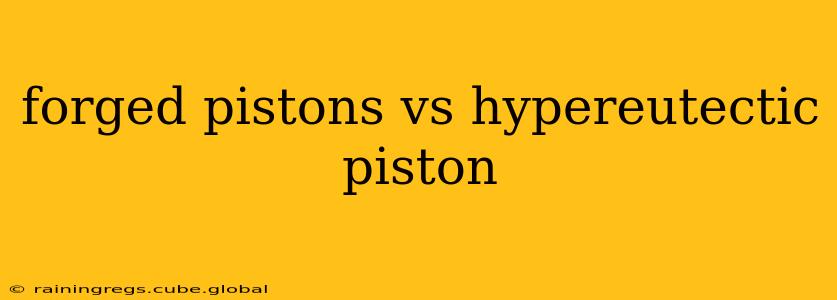Choosing the right pistons for your engine is crucial for performance and longevity. Two popular options often debated are forged pistons and hypereutectic pistons. Each boasts unique characteristics, making the selection depend heavily on your specific needs and engine application. This comprehensive guide will break down the key differences, helping you make an informed decision.
What are Forged Pistons?
Forged pistons are created using a metal forging process. Molten aluminum alloy is poured into a die and then subjected to intense pressure, shaping it into the final piston form. This process results in a denser, stronger, and more consistent material structure compared to cast pistons. The forging process aligns the metal grains, increasing tensile strength and fatigue resistance. This makes forged pistons ideal for high-performance applications and engines subjected to high stress.
Advantages of Forged Pistons:
- Superior Strength and Durability: Forged pistons can withstand significantly higher pressures and temperatures than their cast counterparts, making them perfect for high-performance builds, turbocharged engines, and applications demanding extreme reliability.
- Lighter Weight: The forging process allows for more intricate designs, leading to lighter pistons. Reduced weight translates to less reciprocating mass, improving engine responsiveness and reducing wear on connecting rods and crankshaft.
- Higher Compression Ratios: Their strength allows for higher compression ratios, boosting power and efficiency.
- Better Heat Dissipation: The denser structure facilitates improved heat transfer, preventing overheating and detonation.
Disadvantages of Forged Pistons:
- Higher Cost: The manufacturing process makes forged pistons considerably more expensive than hypereutectic or cast pistons.
- More Complex Machining: The forging process can lead to more complex machining requirements, potentially adding to the overall cost.
What are Hypereutectic Pistons?
Hypereutectic pistons are cast aluminum pistons with a higher silicon content than standard cast pistons. This increased silicon content improves the piston's strength and wear resistance, bridging the gap between cast and forged pistons in terms of performance capabilities. The higher silicon content also provides improved thermal expansion characteristics.
Advantages of Hypereutectic Pistons:
- Cost-Effective: Hypereutectic pistons are significantly less expensive than forged pistons, offering a balance between performance and affordability.
- Good Strength and Durability: While not as strong as forged pistons, hypereutectic pistons are much stronger than standard cast pistons, making them suitable for modified engines and higher-performance applications.
- Improved Wear Resistance: The higher silicon content enhances wear resistance, extending the piston's lifespan.
Disadvantages of Hypereutectic Pistons:
- Lower Strength than Forged Pistons: They are not as strong as forged pistons and are less suitable for extremely high-performance applications.
- More Prone to Cracking under Extreme Stress: While more durable than standard cast pistons, they are still more susceptible to cracking under extreme stress and temperatures compared to forged pistons.
- Less Lightweight than Forged Pistons: They don't offer the same weight reduction benefits as forged pistons.
Forged Pistons vs. Hypereutectic Pistons: Which is Right for You?
The best choice depends on your application and budget.
- High-performance applications (racing, heavily modified engines, forced induction): Forged pistons are the preferred choice due to their superior strength, durability, and ability to handle high stress.
- Mildly modified engines or stock replacement with improved reliability: Hypereutectic pistons provide a cost-effective upgrade over standard cast pistons, offering improved strength and wear resistance.
- Street-driven vehicles with minimal modifications: Standard cast pistons are often sufficient for stock or slightly modified engines.
What are the key differences between forged and hypereutectic pistons?
The primary differences lie in their manufacturing process, resulting in variations in strength, weight, cost, and suitability for different applications. Forged pistons are stronger, lighter, and more expensive, while hypereutectic pistons offer a cost-effective compromise between performance and durability.
How do I choose between forged and hypereutectic pistons?
Consider your engine's application and planned modifications. High-performance engines benefit from the superior strength and durability of forged pistons, while mildly modified engines might find hypereutectic pistons a more affordable and suitable option.
Are hypereutectic pistons better than cast pistons?
Yes, hypereutectic pistons are a significant improvement over standard cast pistons, offering enhanced strength, durability, and wear resistance. They represent a cost-effective upgrade for those seeking improved performance without the expense of forged pistons.
What are the advantages and disadvantages of forged and hypereutectic pistons?
This is detailed above in the dedicated sections for each piston type.
Which type of piston is best for a turbocharged engine?
For a turbocharged engine, the superior strength and durability of forged pistons are essential to withstand the increased stress and pressures.
This guide provides a comprehensive overview of forged and hypereutectic pistons, allowing you to select the appropriate option based on your specific engine requirements and budget. Remember to consult with a professional engine builder for personalized advice.
